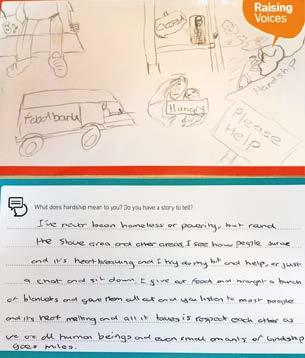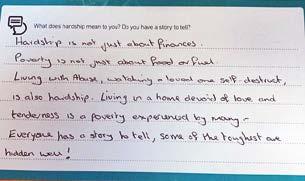
9 minute read
Manifesto for change
Photo by Justina in Raising Voices exhibition
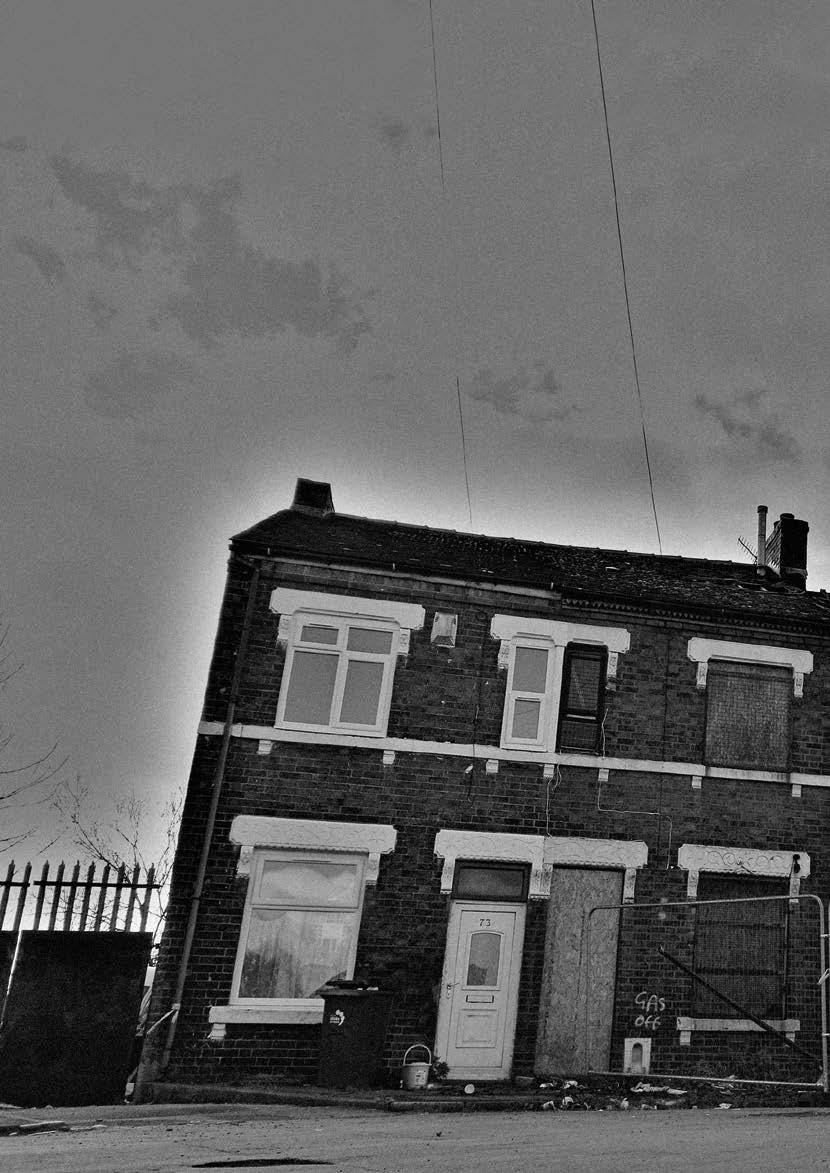
“IT IS DIFFICULT TO UNDERESTIMATE THE HUMAN DISASTER UNFOLDING IN PLACES LIKE STOKE-ONTRENT,” THE AUTHORS OF A STAFFORDSHIRE UNIVERSITY LED REPORT INTO POVERTY HAVE WARNED.
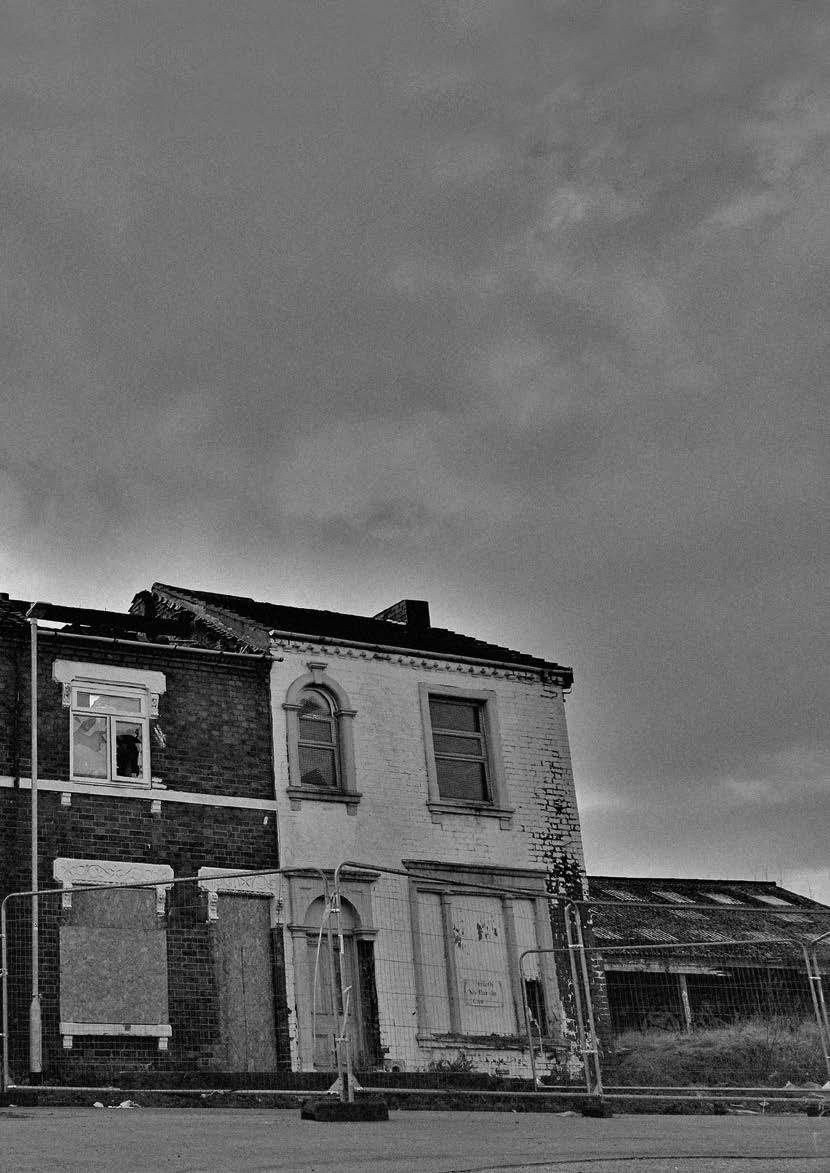
We are all feeling the pinch as inflation hits a 40year high and the price of everything from food to fuel rockets. But for those already struggling, the cost-of-living crisis is rapidly turning into a catastrophe. And there are few places where this is more keenly felt than in Stoke-onTrent.
The city is the 13th most deprived local authority in England, out of 317 districts, with one of the highest rates of people on low pay and with low skills. Some 43% of children in the city are in households living in poverty.
The Governor of the Bank of England has warned of “apocalyptic” food price rises and the prospect of 10% inflation. This will hit those already in poverty particularly hard, as the worst off spend proportionally more of their incomes on the basics of food and energy. The Office of Budget Responsibility predicts the biggest slump in living standards since the 1950s.
Staffordshire University is trying to tackle the issues of hardship in its home city through several avenues. From research – including a paper co-authored by the Vice-Chancellor – and a ground-breaking new degree, to involving communities in storytelling projects and helping produce a Manifesto for Change.
Chief Executive and ViceChancellor Professor Martin Jones co-authored a report with Professor David Etherington and Dr Luke Telford, in conjunction with the local Citizens Advice centre. Launched in 2021 and updated in March, it’s called The Pending Poverty Catastrophe in Stoke-on-Trent: How Benefit Cuts and the Cost of Living Crisis Impacts on the Poor.
It revealed that more than £30 million a year was lost from Stoke-onTrent’s economy after the Government withdrew the £20 uplift in Universal Credit. The extra weekly benefit was introduced to help households through the pandemic but was scrapped last October, hitting Stokeon-Trent’s 30,000 claimants particularly hard. Nationally, half a million more people, including 200,000 children, are set to be pulled into poverty. The report’s authors say: “With high rates of low-paid and insecure jobs, whereby many people were already finding it difficult to make ends meet and afford household essentials, it is difficult to underestimate the human disaster that is unfolding in places like Stoke-on-Trent.”
Steve Wyn Williams, a visiting professor in Human Geography at Staffordshire University, is Chair of Stoke-on-Trent’s Hardship Commission, which wrote a letter to local MPs condemning the end of the Universal Credit uplift.
“We said it was disgraceful, and it’s something I feel very strongly about,” he explains. “Governments are here to support their people and it would make a huge difference. Reinstating the uplift and making it permanent is a simple way to help people quickly, as is imposing a windfall tax on energy companies.
“We talk of a cost-of-living crisis, but I think it is a catastrophe. It will affect everybody but especially those areas, like Stoke-on-Trent, which have suffered in the past from a lack of investment and a lack of a skilled workforce. It has happened incrementally over decades, but the pandemic and the war in Ukraine have been major shocks to the system, so it feels like the crisis has happened very quickly.
“There’s a great community in Stoke-on-Trent and we do pull together, but it’s an uphill struggle at the moment.”
The Hardship Commission has recently changed its focus, from monitoring data and raising awareness to taking more direct action as a campaigning group. It has produced a Manifesto for Change by working with the Raising Voices, Changing Minds, Ending Poverty project.
Raising Voices’ roots were planted in 2019 with a Staffordshire University project. Get Talking Hardship was commissioned by the Hardship Commission, funded by the National Lottery and run by Nic Gratton, Associate Professor of Community and Civic Engagement.
A team of 43 community researchers, many with direct experience of hardship, were trained to conduct interviews with 250 people. A heart-breaking picture emerged in its report, with comments such as: “We try our best to bring up our children with manners, positive attitudes and hope (when we have none).”
Nic says: “We had the data around hardship, but we understand people’s stories better than percentages. I remember one person said ‘Surely the statistics say it all?’ but someone replied ‘You’re never going to change the world with an Excel spreadsheet’. It’s very easy to think ‘that’s a terrible statistic’ but it’s quite different to hear of a mother who takes her kids to their grandparents three times a week because she can’t afford to feed them. She gets them excited for the treat, but it’s because she has nothing in the cupboard.
“We hadn’t quite appreciated the emotional impact on the community researchers. There wasn’t a single session when there wasn’t someone in tears. We felt we needed to support them and they continue to have access to our staff counselling service at the University.
“Now we are building on that work with Raising Voices, Changing Minds and Ending Poverty. We went back to some of the community researchers and pulled together a steering group. We’re telling the story in a more creative way to engage people. We have photographers who’ve been homeless, people who used poetry to get them through lockdown and people interested in podcasting. We produced an exhibition that’s now online.
“The steering group worked with the Hardship Commission to produce the Manifesto for Change. We’re bringing together people talking about hardship and people actually experiencing it and making it one voice. The value of bringing learned and lived experience together is very powerful and has a greater impact.”
The Manifesto’s aims are to work closely with decision-makers, humanise the issues and reduce the stigma attached to hardship, as well as securing funding for impactful projects to address poverty.
Last year Staffordshire University launched its innovative BA (Hons) Action on Poverty and Hardship degree and also helps disadvantaged students through its Horizon Fund.
Nic says: “There’s a perception that university students are rolling in cash but that’s absolutely not the case. Many of our students are local and so the hardship issues of the area affect them too.”
Steve adds: “Students are suffering greatly. Many have taken out maintenance loans to pay their living costs, but that’s eroded very quickly these days. The £200 energy rebate applies to households, so it wouldn’t go far between five people sharing a house. And lowering the threshold of when they have to pay back loans doesn’t help.”
Nic concludes: “Poverty is a really important issue for us as a University. Our Vice-Chancellor is writing reports and we are working with our partners and the community. We are well connected at all levels to understand the issues.
“We understand the data but we’ve also built up relationships and trust so we can raise the voices of those with lived experience.
“And the work we do is inspiring and creative. It’s not all doom and gloom, it’s very much working together to find solutions.”
STATS AT A GLANCE
• The average gross weekly pay in Stoke-on-Trent is £519, 20% less than the UK average of £630.
• In the three months from April to June 2021, Citizens Advice in
Staffordshire North and Stoke-on-Trent issued 45 foodbank and 7 fuel vouchers. In less than a month this year, from January 29 to February 25,33 food bank and 43 fuel vouchers
were issued – and that was even before the fuel price hike.
• Stoke-on-Trent Trussell Trust has 15 food banks and gave emergency food to almost 15,000 people in the last year.
• Stoke-on-Trent has been branded the ‘capital of debt’, with the highest rate of personal insolvencies in 2017, more than
double the national average. The city has the 10th highest rate in the UK for mortgage repossessions.
• Over half – 51% – of areas in Stoke-on-Trent are classified among the most deprived 20% in England,
while one third (32%) fall into the most deprived 10%.
• Some 84% of wards across Stoke-on-Trent contain households that say they find it ‘difficult’ or ‘very difficult’
to manage their household income, far higher than the national average of 28%.
WHAT STAFFORDSHIRE UNIVERSITY IS DOING TO HELP
Staffordshire University’s trail-blazing BA (Hons) Action on Poverty and Hardship degree began in September 2021 to develop the change-makers of the future. It’s centred on the lived experience of those who have faced hardship, and students work closely with people who have experienced poverty first-hand.
Nic Gratton says: “I’m blown away that this is a degree, that Staffordshire is brave enough to test it out.”
Staffordshire University staff voted to make Alice Charity their corporate charity for 2022. The organisation provides practical and emotional support for disadvantaged and vulnerable families and in 2021 helped more than 3,500 families in North Staffordshire.
Funds raised will be split evenly between Alice Charity and the Horizon Fund, which was created to overcome the financial barriers into university and make higher education more accessible for people from disadvantaged backgrounds.
Students have been awarded bursaries and scholarships, including Sherry Matthews who received a Social Action Bursary funded by the Joseph Rowntree Foundation. This meant the 29-year-old, from Newcastle-under-Lyme, could take her place on the new Action on Poverty and Hardship degree, and drop one day working as a Nursing Assistant at Royal Stoke University Hospital to volunteer with the Alice Charity. She said: “I’m really passionate about this course because I’ve been there. We didn’t have much growing up but having that first-hand experience, along with the skills from this degree, means that I will be able to help others in the same situation.”
RAISING VOICES
EXHIBITION
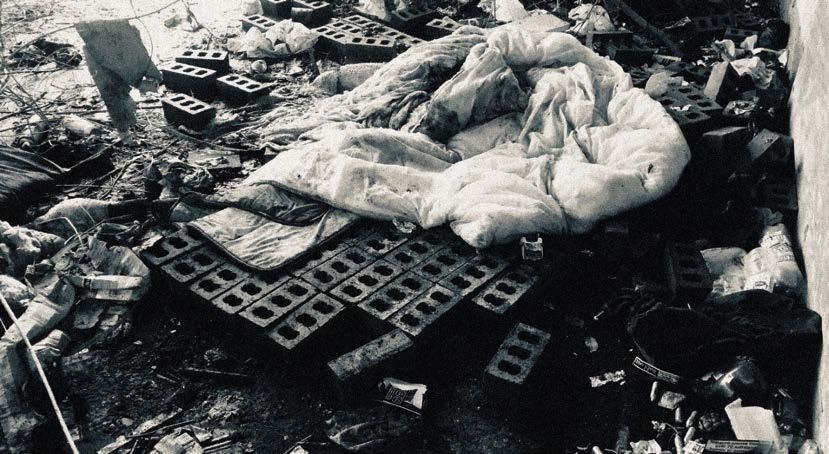
The Raising Voices exhibition opened at the University’s Catalyst Building in March and has now gone online. It includes photographs, postcards and poems.
One photograph, by Justina, shows derelict houses with boarded-up and broken windows. She wrote: “I got a frustrated feeling seeing the potential this city has of rebuilding some of these properties and providing more spaces for the people that need it. However, it’s not all bad news. There are supportive networks that can help see some light in hardship.”
Another photograph from Simon shows Pyenest Street where, he says, “We were confronted by dereliction, lost employment, bygone community, drug use and general unpleasantness. For those of us who’ve been forced to live amongst this type of disregard for the quality of our environment, its mental health, social and economic implications, it was hardly a revelation. However, photographing this place has highlighted that in each and every image there is an all too often forgotten human story.”
Others wrote postcards with their thoughts on the question ‘What does hardship mean to you?’. One person drew a closed shop, a foodbank van and someone pushing a huge boulder up a hill. Another wrote: “Hardship is not just about finances. Poverty is not just about food or fuel. Living with abuse, watching a loved one self-destruct, is also hardship. Living in a home devoid of tenderness is a poverty experienced by many. Everyone has a story to tell, some of the toughest are hidden well.”
Photo by Simon in Raising Voices exhibition
